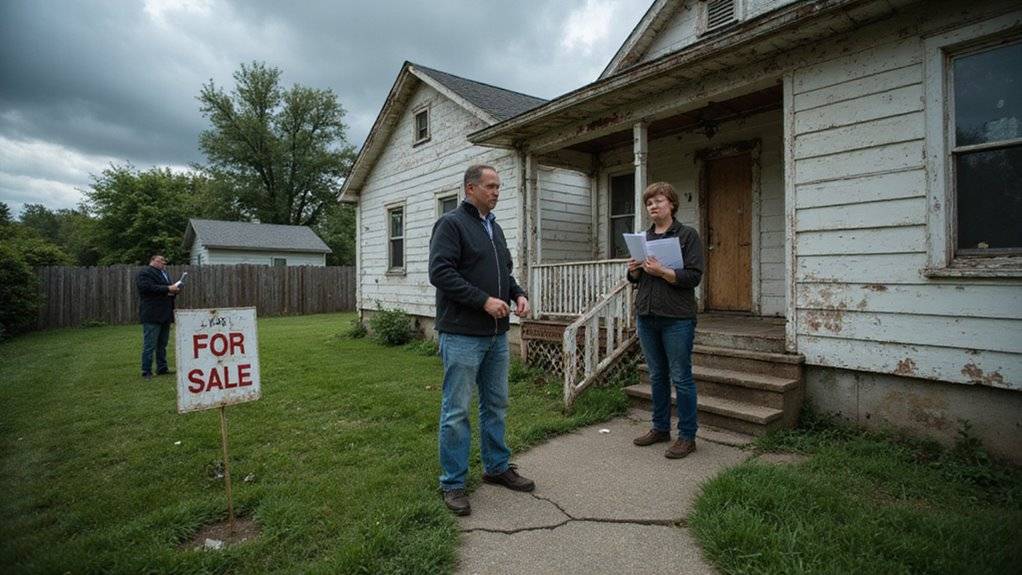Selling a house with code violations is risky. You might face legal problems and lose money if you are not careful. Many sellers do not realize the serious legal risks involved.
These risks can quickly become overwhelming. Buyers may sue, deals may fall apart, and you could get hit with fines. Even one missed violation can destroy your sale.
The best way to avoid legal trouble when selling a house with code violations is to disclose all issues and follow the law.
Always be honest and address problems before listing your home. This can save you from expensive headaches later. This blog will guide you step-by-step so you can sell your house safely and legally.
Key Takeaways
- Failure to disclose known code violations can result in lawsuits for misrepresentation, fraud, or breach of contract.
- Sellers may face financial penalties, be required to pay for repairs, or compensate buyers for property devaluation.
- Unresolved violations can delay or cancel the sale due to lender or title issues.
- Municipal fines may accumulate daily until violations are corrected or disclosed to the buyer.
- Selling “as-is” does not remove the seller’s obligation to disclose all known hazards and code violations.
Understanding Code Violations in Residential Real Estate

A code violation happens when a home does not follow local building or zoning rules. These rules are in place for safety and community standards. Code violations can cause problems when you try to sell your house. If you work with O’Fallon cash home buyers, you may be able to sell your house even if it has code violations, since they buy properties as-is and handle all paperwork.
If your home has issues like unapproved decks or old wiring, buyers may worry. Lenders and inspectors will check for these problems. If they find violations, the sale could be delayed or fall through.
Cities may give fines or require you to fix the issues. You should check your local codes before selling. If you find violations, fix them or get help from a professional.
If you are thinking about selling a house with code violations, you might consider selling a house as-is, which allows you to avoid making repairs but could result in lower offers from buyers.
Types of Code Violations That Impact Home Sales
When you’re preparing to sell your home, you need to watch for common structural violations and any safety or health hazards. Issues like faulty wiring, unauthorized additions, or mold can quickly derail a sale and expose you to legal trouble.
Addressing these problems early not only protects you legally but also makes your property far more attractive to buyers. Sellers can benefit from working with trusted experts who understand how to manage homes with code violations and ensure a fair sales process. In some cases, selling your home as-is in Florissant lets you avoid making costly repairs while still attracting buyers who are prepared to handle these violations.
Common Structural Violations
Common structural violations can cause serious problems for home sellers. These issues are not just cosmetic and can affect a sale. Buyers and inspectors may see them as red flags.
Foundation problems, unapproved changes, and illegal additions are frequent violations. Such issues often lead to failed inspections or reduced offers. If left undisclosed, they may result in lawsuits after the sale.
The following table shows typical violations, warning signs, and legal risks:
| Violation Type | Common Signs | Legal Risk |
|---|---|---|
| Foundation Issues | Cracks, uneven floors | Lawsuits, sale cancellation |
| Illegal Additions | No permits, odd layouts | Fines, forced removal |
| Unpermitted Remodels | Non-code wiring/plumbing | Re-inspection, buyer withdrawal |
| Structural Alterations | Removed walls, sagging | Property devaluation, litigation |
You should fix these problems before listing your home. Doing so may help protect your sale and prevent legal trouble. If unsure, consult a qualified professional.
Safety and Health Hazards
Safety and health hazards can create serious legal problems for home sellers. If your home has fire risks or environmental dangers, you may face lawsuits. Buyers must be told about these hazards if you want to avoid legal trouble.
Fire risks include bad wiring, missing smoke alarms, or blocked exits. Environmental problems like mold, asbestos, or lead paint are also important to check for. If a buyer gets hurt or finds these issues later, you could be forced to pay for repairs.
You should inspect your home for these hazards before selling. If you find problems, fix them as soon as possible. Keeping records of repairs and disclosures can protect you from future claims.
Mandatory Disclosure Laws for Sellers

Real estate sellers must follow mandatory disclosure laws. You must tell buyers about any known code violations before selling your property. Most states require a written disclosure statement.
This statement should list all material defects, such as environmental hazards and zoning issues. Sellers must report unresolved code violations, like unpermitted additions or hazardous materials. If you hide these problems, you may face legal action later. In some cases, working with trusted local experts can help you understand what needs to be disclosed and how to handle violations before closing.
Common violations include structural damage, lead paint, and mold. You must also disclose issues with zoning or land use. Minor problems can also need disclosure, depending on state laws.
If you are unsure about what to reveal, check your state’s rules. Consulting a real estate attorney can help. Honest disclosures reduce your risk of future disputes. If you decide to sell a house with code violations in Ballwin, some cash home buyers will purchase the property as-is, helping you avoid repairs and navigate disclosure requirements.
Consequences of Nondisclosure to Buyers
If you fail to disclose known code violations, you risk being held liable for hidden defects after the sale. Buyers can take legal action against you, seeking compensation or even rescinding the transaction.
Foundation issues and other code violations can directly decrease your home’s value by 10-15% or more, making full disclosure even more critical to avoid future claims.
Protect yourself by fully disclosing all issues upfront to avoid costly disputes down the line. Working with local North County buyers who offer fair cash offers can help ensure a transparent and honest selling process.
Liability for Hidden Defects
You are legally responsible if you do not tell buyers about hidden defects. These defects include unapproved changes, bad wiring, or structure problems. Buyers expect you to be honest about everything wrong with the property.
If buyers find problems after purchase, insurance may not help because you did not disclose them. Both you and the buyer could lose money. Title issues can also happen and make it hard for buyers to sell or refinance later.
Failing to follow state disclosure laws can force you to pay for repairs or lost value. You should always write down and share any problems you know about. Full honesty protects you from legal trouble related to hidden defects.
Potential for Legal Action
If you do not disclose code violations or hidden defects, you may face legal trouble. Buyers can sue for misrepresentation, fraud, or breach of contract if they discover problems after the sale. Courts often support buyers if sellers knowingly hide information.
Liability insurance may not protect you if you fail to disclose on purpose. You could be required to pay for repairs, damages, or even cancel the sale. Legal advice before listing your property can help you avoid these risks.
The table below shows common legal risks and steps you should take:
| Legal Risk | Recommended Action |
|---|---|
| Buyer Lawsuit | Full Disclosure |
| Fraud Allegations | Consult Legal Counsel |
| Contract Breach Claims | Review Sale Agreement |
| Insurance Exclusions | Check Liability Insurance |
| Court-Ordered Remedies | Address Violations Early |
Impact on Property Value and Marketability

A house with unresolved code violations usually loses value and is harder to sell. Buyers often see violations as risks and may offer less money. Lenders can refuse loans, making it tough to find qualified buyers. If you want to avoid these challenges, working with a family-owned local business that buys houses as-is can help you bypass the traditional hurdles of code violations.
Code violations may also cause title problems during closing. Title insurance companies often avoid properties with unresolved legal or city issues. If these problems are not fixed, buyers might ask for big discounts or repairs.
Resolving violations before selling your house can help. It makes the title process easier and reassures both buyers and lenders. This leads to a smoother and more profitable sale. Additionally, if you are selling a property purchased through a land contract, you must review the original contract’s terms for any restrictions on transferring ownership, as unresolved legal issues can further complicate the sale process.
Legal Obligations During the Sales Process
Unresolved code violations create legal duties for you when selling your home. You must tell buyers about any known violations. These can include problems with the structure, safety, environment, or zoning. If you are selling an older home, buyers may also want to know if there are other issues like asbestos presence, since this can affect both property value and legal obligations.
If you do not share this information, the contract could be canceled or you may have to pay fines. Some towns require you to fix violations or get permits before selling. You may also need to show buyers proof of cleared violations or zoning compliance.
Buyers often hire inspectors who will find most issues. Lenders may refuse to approve loans if the home has major code problems. Full honesty helps protect you and makes the sale process easier. Sellers should also be aware that failing to disclose state-specific requirements can result in legal responsibility and potential lawsuits.
Risks of Buyer Lawsuits After Closing

After closing, you face significant legal exposure if you didn’t disclose known code violations to the buyer. Buyers can sue for breach of contract or misrepresentation, claiming you failed to meet your disclosure obligations. To protect yourself, document all disclosures and ensure your sales contract addresses existing violations clearly.
If you want to avoid the hassle and risk, consider working with trusted local home buyers who understand how to handle homes with code violations in St. Charles County. If you’re selling your primary residence, it’s also important to understand how capital gains tax exclusions might apply to any profit from the sale.
Failure to Disclose Violations
If you do not tell buyers about known code violations, you risk legal trouble. Most states require sellers to share this information. Hiding violations can lead to lawsuits for fraud or misrepresentation.
Buyers may say you kept back important facts. These facts could change the sale or the property’s value. Lawsuits may result in canceled sales or money damages.
Undisclosed violations can also affect the property title. This may lead to problems for both you and the buyer. If possible, always give written disclosures and get buyers’ signatures.
Clear and honest communication protects you from future legal issues. It is safer to share violations up front. This helps avoid costly problems later.
Breach of Contract Claims
If you do not fix code issues before closing, you could face breach of contract claims. Buyers expect the home to follow local codes and rules. If it does not, they may sue you after closing.
Purchase agreements often say the home will meet code and zoning rules. Any unpermitted changes or violations can lead to legal trouble. Buyers might ask for repairs, money, or other solutions.
You should read your contract carefully and know your responsibilities. If needed, try to agree on repairs or credits with the buyer before closing. Talking to a real estate lawyer can help you avoid problems.
How Code Violations Affect Mortgage Approvals
Code violations can make it hard to get a mortgage. Lenders usually want homes to meet local codes before they approve a loan. If a property has violations, lenders might deny or delay the loan.
Unresolved violations can also lead to costly repairs before closing. Lenders want to avoid risks from unsafe or unapproved work. They do this to protect themselves from future problems or insurance claims.
Some violations may also affect property taxes. If violations change the home’s value, the tax bill could go up. This might also cause a tax reassessment.
If you fix violations early, you can avoid losing buyers. Always keep records of any repairs. This helps the sale go smoothly and keeps your price strong.
For homeowners who want to sell houses as-is, working with a local investor can be a good way to avoid the hassle of making repairs required by lenders.
Municipal Fines and Penalties for Noncompliance

Municipal fines and penalties are financial charges for not following local codes. Authorities can issue these fines if you sell a house with unresolved code violations. Fines often increase daily or weekly until you fix the problem or change property ownership.
Each city or town decides its own rules and fine amounts. Penalties can become larger if you do not respond to official notices or delay needed repairs. Ignoring violations can lead to extra charges for each rule you break.
If you address code violations before selling, you can avoid these fines. Always check your local codes to understand what is required. Speaking with a real estate lawyer or code office can help you avoid unexpected costs.
The Role of Home Inspections in Uncovering Violations
When you order a home inspection, you’re likely to catch common code violations such as faulty wiring or missing permits before they turn into legal headaches. Inspectors play a crucial role in identifying these issues, but keep in mind they can’t uncover every hidden defect or guarantee full compliance. To protect yourself, make sure you understand both what inspectors look for and the limits of their assessments.
Common Violations Detected Early
Home inspections often uncover code violations that can slow down or stop a home sale. Early detection of these problems helps you fix them and avoid legal trouble. Common issues involve old building codes or changes made without permits.
Inspectors may find violations if your basement was finished without permission. Unpermitted work is a warning sign for buyers and might delay the sale. If these problems exist, you should address them quickly.
Here are some common violations inspectors find:
| Violation Type | Typical Example |
|---|---|
| Electrical | Outlets in wet areas without GFCI protection |
| Plumbing | S-traps under sinks that are not allowed |
| Structural | Room additions built without a permit |
| HVAC | Appliances that are not vented properly |
| Safety | Missing smoke or carbon monoxide detectors |
If you fix these issues before selling, your transaction is more likely to go smoothly.
Inspector Responsibilities and Limitations
A home inspection checks the visible condition of a property. Inspectors look for obvious problems and possible code violations. They do not guarantee to find every issue.
Inspectors do not move furniture or open walls. They cannot check hidden systems in detail. Some issues may stay hidden during the inspection.
Homeowners must share known problems before selling. If you do not fix code issues, you may face legal trouble later. A clean inspection report does not remove your duty to disclose or repair known violations.
Negotiating Repairs or Credits With Buyers
You can still sell your property if it has code violations by negotiating repairs or credits with buyers. Buyers may accept a credit at closing or ask you to fix certain issues.
If the violations do not affect property taxes or zoning, a sale is often possible. Selling a property with code violations is possible by negotiating repairs or credits, as long as taxes and zoning aren’t affected.
Sellers should share inspection reports and repair estimates with buyers. Some buyers may want a credit, while others prefer repairs before closing. Sellers must ask buyers what they prefer.
You should check how code violations impact property value and taxes. If violations are minor, buyers may be flexible. Always review local zoning rules to avoid future problems.
Work with your agent to create fair repair or credit terms. Make sure both sides agree on the solution. Good negotiation can help keep your sale moving forward.
Selling As-Is: What It Really Means Legally
Selling your property “as-is” means you will not make repairs or offer credits for problems. This includes any known code violations. The law still requires you to share all known issues with buyers.
Sellers must disclose any hazards, like mold or environmental risks. You also need to inform buyers about zoning rules or if the property use is not compliant. If you hide major problems, buyers can take legal action.
Buyers usually expect transparency when buying as-is. If you are open about issues, buyers may offer less money or ask for inspections. Proper disclosure helps protect you from future disputes.
Staying informed about these rules can help you avoid costly surprises. If you are unsure, consult a real estate lawyer. Honest communication is key to a smooth sale.
Working With Real Estate Agents and Attorneys
Real estate agents and attorneys can help you sell a house with code violations. They guide you through risks and legal requirements. Working with them makes the sale process safer and easier.
A real estate agent explains local zoning laws clearly. The agent can also help you avoid mistakes that could cost you money. If you have questions about rules, the agent can answer them.
An attorney checks your property tax situation and reviews legal documents. If you have unpaid taxes, the attorney will advise you on what to do. The attorney can also draft contracts and disclosures that protect you.
Both professionals help you negotiate with buyers. If a buyer asks about code violations, they ensure you answer correctly. Their help reduces your chances of legal trouble. If you want a smooth sale, consider hiring these experts. Their support keeps your transaction safe and legal.
Steps to Minimize Liability Before Listing
You can reduce your legal risks before listing a house with code violations. Order a complete home inspection to find all violations and hidden hazards. List these issues in writing for all buyers to see.
If zoning rules do not match the property’s use, fix any problems before listing. Get repair estimates so buyers know the likely costs. If buyers understand the repairs, they can make informed choices.
Always work with real estate agents or lawyers to prepare correct disclosures. These steps show good faith and help prevent legal problems after the sale. Taking these actions also protects you from future disputes.
Conclusion
If you want to sell a house with code violations, you must understand the legal risks involved. If you fail to disclose issues or fix them, you could face lawsuits or financial penalties. If you address violations early, you can avoid many problems during the sale process.
If you need to sell quickly, a traditional sale may not be the best option. If you contact us, we can buy your house for cash, even with code violations. If you work with experienced investors, you can save time and reduce stress.
If you want a hassle-free solution, we are here to help. At Freedom Path Investors, we buy houses in any condition and close fast. If you are ready to sell, contact us today for a fair cash offer.







